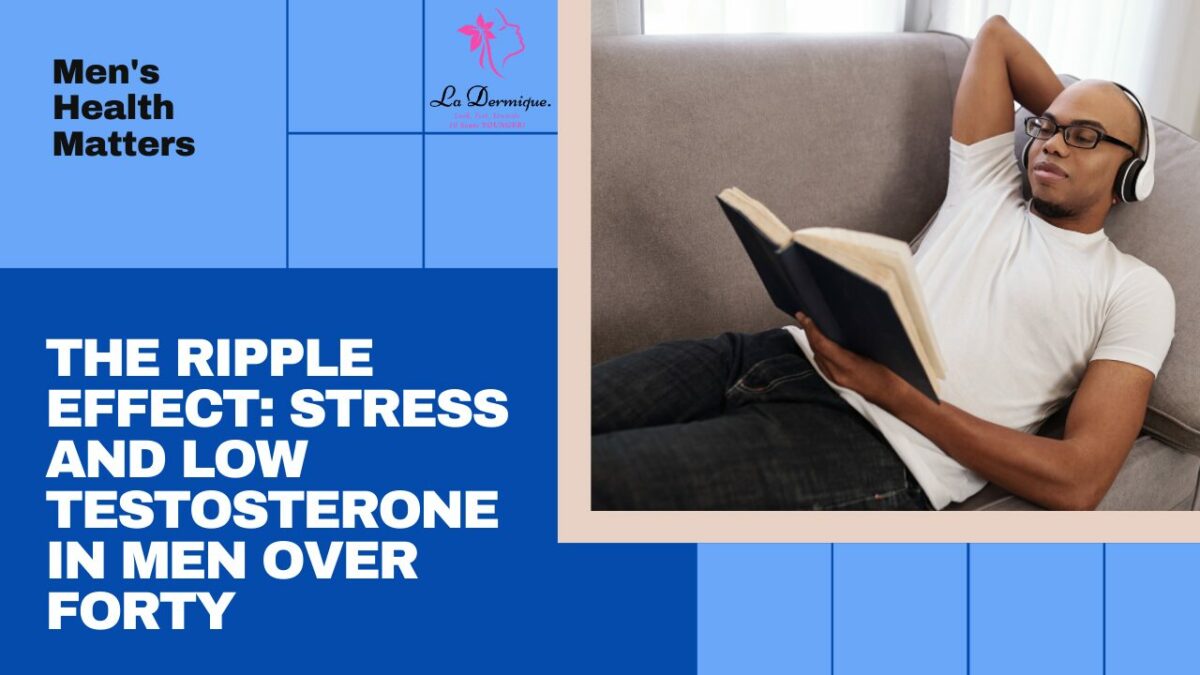
Table of Contents
In today’s fast-paced world, stress has become an unwelcome companion for many. But did you know that stress can have profound effects on the hormonal balance of men over the age of forty?
Understanding stress and low testosterone in men
To comprehend the impact, let’s delve into the relationship between stress and low testosterone in men over 40. Testosterone, a key male hormone, plays a crucial role in maintaining physical and emotional well-being.
Research suggests that chronic stress can lead to a significant decrease in testosterone levels, disrupting the delicate hormonal balance in men.
Effects of stress and low testosterone levels in men
Emotional effects
As testosterone levels decline, men may experience a range of social and emotional challenges.
Socially, stress-induced testosterone imbalance can contribute to feelings of isolation and strain in relationships. Emotionally, it may lead to increased anxiety and depression, affecting one’s overall quality of life
The ceaseless pressure from work, family, and commitments often leads to chronic stress. This unrelenting strain disrupts the body’s hormonal balance, specifically testosterone.
Testosterone isn’t just about strength and virility; it is also a key player in a man’s emotional well-being. Low levels can lead to anxiety, depression, and mood swings.
As testosterone plummets, men over forty may find themselves grappling with emotional turmoil. They could feel irritable, struggle with concentration, and even lose interest in activities they once enjoyed.

Physical effects
The impact of stress and low testosterone in men, also known as hypogonadism, can manifest in various physical signs in men. It’s important to note that these signs can vary in severity, and their presence may not necessarily indicate a connection between stress and low testosterone in men levels, as other factors could contribute. If someone suspects they have low testosterone, it’s crucial to consult with a healthcare professional for proper diagnosis and guidance. That said, here are some physical signs associated with low testosterone levels:
- Decreased interest in sex or a decline in sexual desire.
- Difficulty achieving or maintaining an erection.
- Persistent tiredness, low energy levels, and reduced stamina.
- Loss of muscle mass and strength, despite regular physical activity.
- Changes in body composition, with an increase in body fat, especially around the abdomen.
- Thinning of hair on the face and body, including a reduction in facial and body hair.
- Weakening of bones, potentially leading to an increased risk of fractures.
- Irritability, mood swings, increased stress, and a general sense of unease.
- Sudden episodes of feeling overheated, often accompanied by sweating.
Social effects
Stress can have significant social effects on individuals, which, in turn, may impact testosterone levels and human relationships. While the relationship between stress and testosterone is complex and bidirectional, the social consequences of stress can contribute to changes in hormone levels and interpersonal dynamics. Here are some social effects of stress that can influence testosterone levels and relationships:
Social Withdrawal:
Stress may lead to social withdrawal or isolation. Reduced social interactions can contribute to feelings of loneliness and affect testosterone levels negatively.
Relationship Strain:
Chronic stress can strain relationships. Increased irritability, mood swings, and a decreased ability to cope with stressors may lead to conflicts and misunderstandings within relationships.
Communication Breakdown:
Stress can impair effective communication. Individuals experiencing high levels of stress may have difficulty expressing themselves or understanding others, leading to communication breakdowns in relationships.
Intimacy Issues:
- Stress may negatively impact intimacy. Changes in libido and sexual function, often associated with elevated stress levels, can affect the emotional and physical aspects of intimate relationships.
Decreased Empathy:
Stress can reduce an individual’s capacity for empathy. This may result in a diminished ability to understand and respond to the needs and emotions of others, affecting the quality of interpersonal relationships.
Increased Tension:
High-stress situations can create a tense atmosphere in relationships. Elevated stress levels may lead to heightened emotional responses, making it challenging to navigate conflicts and disagreements.
Role Strain:
The demands of stress, whether related to work, financial issues, or other factors, can lead to role strain within relationships. Balancing responsibilities and expectations may become more challenging.
Impact on Social Activities:
Stress can limit participation in social activities. Individuals under significant stress may be less inclined to engage in social events and activities, potentially affecting their social support networks.
Depression and Anxiety:
Prolonged stress can contribute to the development of depression and anxiety. These mental health challenges can further strain relationships and impact the overall social well-being of individuals.
Parenting Challenges:
Stress can affect parenting dynamics. Elevated stress levels may influence parenting styles, impacting the quality of parent-child relationships.
It’s essential to recognize the interconnected nature of stress, testosterone, and social dynamics. Addressing stress through effective coping mechanisms, communication strategies, and seeking support can contribute to better overall well-being and healthier relationships.
Seeking professional advice, such as counseling or therapy, can also be beneficial in navigating the social and emotional consequences of stress.
In conclusion
In conclusion, the intricate interplay between stress and testosterone levels underscores the profound impact on men’s physical, emotional, and social well-being. As stress takes its toll, testosterone levels may wane, leading to a cascade of effects ranging from reduced libido and muscle mass to strained relationships and heightened emotional turmoil.
Acknowledging the significance of this connection is a crucial step toward fostering a holistic approach to men’s health. By prioritizing stress management techniques, adopting healthy lifestyle choices, and seeking support when needed, men can reclaim control over their well-being. It’s not merely about mitigating the symptoms but empowering men to lead fulfilling lives marked by resilience, vitality, and strong, supportive connections.
Understanding the nuanced relationship between stress and testosterone opens the door to comprehensive strategies for promoting long-term health and happiness.







